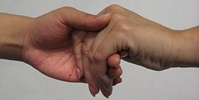History
Sugaring began hundreds of years ago by the Egyptians. As deodorants and soap were not available, they found that their underarm and pubic hair they could stay fresher and cleaner. So they developed sugar paste, so sugaring is the oldest most natural form of hair removal.
It is a safe and natural way to remove unwanted hair and is now used by modern men and women as part their beauty routines. It is a popular alternative to waxing.
Imagine your hair was a lawn. Shaving simply cuts the growth back and encourages new stronger growth!!!
All about sugaring
Sugar paste is made of sugar, lemon juice and water. It is 100% natural, not tested on animals and is environmentally friendly. It contains no chemicals.
The product is a blend of natural ingredients therefore eliminating the possibility of any harmful side effects.
It is gentle on the skin. This is because it is water soluble, applied warm (not hot) and it doesn't stick to anything moist. Therefore it doesn't stick to the skin or live skin cells, only the hair, with the hairs pulled cleanly from the roots unbroken and without bruising the surrounding area. This is less traumatic for the skin and therefore less painful than waxing. This method is good for people with sensitive, dry or older skin and for those with eczema.
It is suitable for all skin types and may improve eczema and psoriasis by removing the top layer of dead skin and encouraging the healing of the skin underneath.
Sugar paste is applied to the skin and then flicked off. It removes the hair from the root. Because of this re-growth is slower, finer, softer and lighter in colour and can lead to gradual diminished hair growth. This is because each hair follicle is programmed to produce a certain number of hairs in its lifetime. By removing the hair from the root the follicle is stimulated to produce its next hair more quickly than it would have done if the hair had been shed naturally. The follicle then gets through its programmed number of hairs more quickly after which it will stop producing a hair.
As dead skin is removed, the skin is left soft, smooth, healthy looking, clearer looking and revitalised, and stubble free for a few weeks.
Being sugared
Avoid sugaring after a bath or shower as the skin is more sensitive.
Avoid using moisturising creams, perfumed soaps and deodorants on the area to be treated at least 1 day prior to sugaring as this can stop the action of the sugar paste.
The first sugaring treatment may cause skin discomfort and redness, but this will lesson after subsequent treatments. Normally treatments are every 4-6 weeks depending on the individual's rate of hair growth.
People have different pain thresholds and certain body areas are more sensitive than others, therefore the pain from sugaring will vary. However sugaring is less painful than removing a plaster from hairy skin!!
After the sugaring treatment;
• Avoid moisturising creams, perfumed soaps and deodorants on the treated areas
• Avoid prolonged exposure to the sun as this may cause skin irritation
Areas that can be sugared;
Eyebrows, top lip, chin, shoulders, back, chest, arms, underarms, bikini line and legs.



